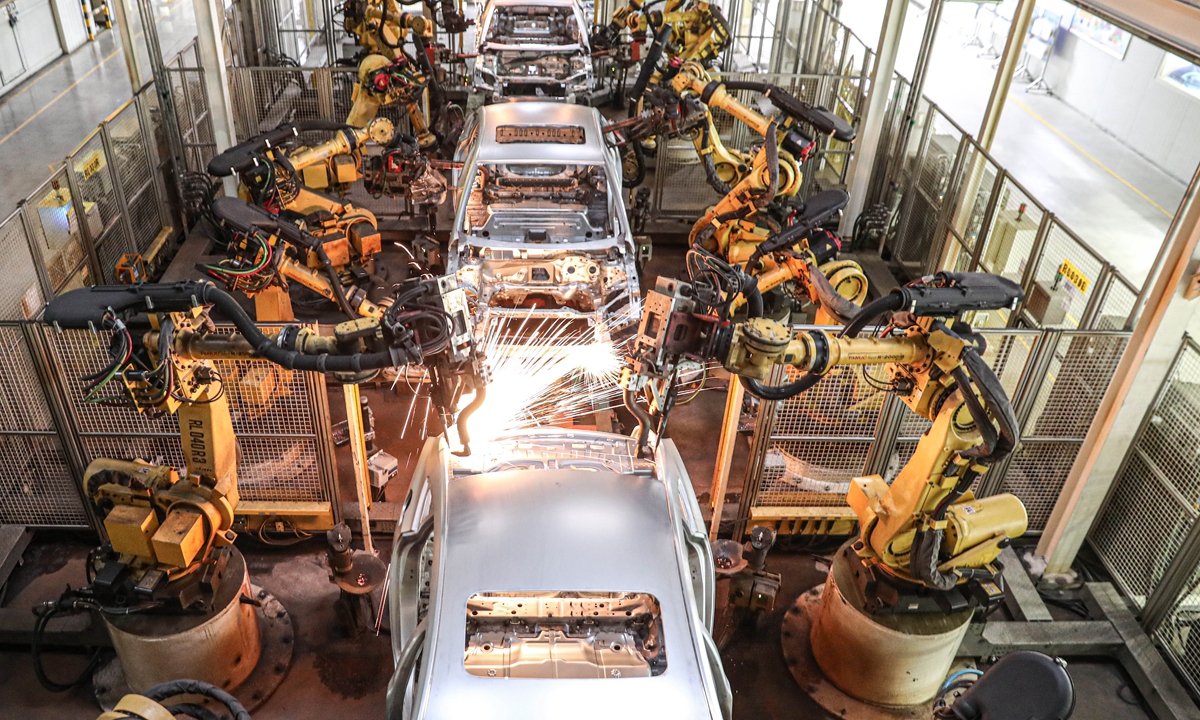
An automated production line at a car factory in Shenyang, Northeast China's Liaoning Province. Photo: IC
China made new advances in high-quality development in 2022 despite domestic and external challenges, with hard-won high-tech industrial output and infrastructure investment growth becoming a highlight last year, which helped shore up the fundamentals of the overall economy, official data showed on Tuesday.
Given the swift policy shift in pandemic management, experts expect the country's industrial output will post remarkable growth while investment potential will be further released this year, contributing to the improvement of the nation's industrial competitiveness, experts said.
The National Bureau of Statistics (NBS) announced on Tuesday that the value added of industrial enterprises above the designated size increased by 3.6 percent year-on-year in 2022.
The value added of high-tech manufacturing went up by 7.4 percent year-on-year and equipment manufacturing up 5.6 percent year-on-year, or 3.8 percentage points and 2.0 percentage points faster than that of the industrial enterprises above the designated size, according to the NBS.
Investment posted stable growth last year, with fixed-asset investment up 5.1 percent to 57 trillion yuan ($8.42 trillion), the NBS said. Infrastructure investment went up by 9.4 percent and investment in manufacturing rose by 9.1 percent. Especially, the investment in high-tech manufacturing grew by 22.2 percent and that in high-end services up by 12.1 percent year-on-year.
"These achievements were extremely difficult given the higher base in 2021 and mounting headwinds like the fallout from COVID-19 resurgences, growing geopolitical tensions and frequent financial tightening overseas," Deng Haiqing, chief economist of AVIC Fund Management Co, told the Global Times on Tuesday.
Deng attributed the sound outcomes to the government's pro-growth policies, for example, accelerating the construction of major projects, encouraging businesses to invest in upgrades to technology and equipment, and offering more incentives to boost auto sales.
In November 2022, a document released by the Ministry of Industry and Information Technology and the National Development and Reform Commission called for structural upgrades and improvements to manufacturing quality, and greater support for sectors such as information technology, artificial intelligence, new energy and high-end equipment.
"The better-than-expected results in the country's high-tech sector underscore achievements made through industrial transformation and upgrading, which have become a new impetus for the country's high-quality development," Dong Dengxin, director of the Finance and Securities Institute of the Wuhan University of Science and Technology, told the Global Times on Tuesday.
This year, expanding domestic demand will be important to bolster the economy amid continuously softening overseas demand, with infrastructure investment to continue to drive stable economic growth, Deng said, noting that budget spending in 2023 may surpass last year's level.
The annual Central Economic Work Conference held in December stressed that the proactive fiscal policy should be stepped up for its effectiveness, with a better mix of tools including fiscal deficits, special-purpose bonds and interest subsidies.
UBS economists led by Wang Tao wrote in a note sent to the Global Times that the deficit ratio may be raised to 3 percent of GDP, and special-purpose bond issues may rise to 3.7-3.8 trillion yuan to support infrastructure investment.
The central bank has vowed to use varied monetary policy tools to maintain reasonably ample liquidity in 2023, which will attract more foreign direct investment to the country's capital market amid the rising possibility of bubbles bursting in Western economies.
"Both infrastructure investment and private investment will be greatly ramped up in 2023, if the expectations for GDP growth could recover to pre-pandemic levels recorded in 2019," Dong said.




